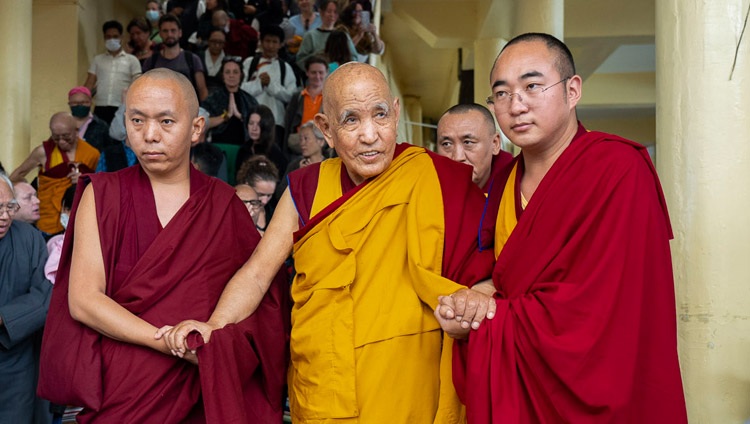Thekchen Chöling, Dharamsala, HP, India - The Ganden Tri Rinpoché resumed his teaching this morning by reciting a verse calling on all beings to come and listen to the nectar of teachings of the Buddha. He quoted Shantideva as saying that since we have this precious human rebirth, a life hard to find but endowed with freedom and opportunity, we should learn what is to be practised in order to make the most of it.

When destructive emotions overwhelm our body, speech and mind, they enslave us. The alternative is to engage in good conduct and create virtue, which means resolving to overcome anger and attachment. What’s most important is to aspire to reach enlightenment for the benefit of all sentient beings. This is the motivation with which we should listen to the teachings of the Buddha.
Tri Rinpoché explained that in the seven-part cause and effect method for cultivating bodhichitta we meditate on all beings as having been our mothers. We reflect on their kindness and seek to repay it. We regard all sentient beings with affection, which leads to our developing compassion and the special resolve to liberate them all from the cycle of existence.
An alternative approach is to engage in exchanging self and others. This involves seeing all beings as equal, reflecting on the disadvantages of self-centredness and the advantages of cherishing others. We imagine taking on the negative aspects of all sentient beings and giving them all positive qualities, and on the basis of this we generate bodhichitta.
The ‘Offering to the Spiritual Master’ (Lama Chöpa) explains this as follows:
Since self-centredness is the doorway to all torment,
While caring for my mothers is the foundation for all that is good,
Inspire me to make the core of my practice
The yoga of exchanging myself for others.
Having generated bodhichitta, Bodhisattvas train in the Six Perfections. The wise follow the good path of completely giving away body, possessions and virtue. ‘Entering into the Middle Way’ advises that if we can see the gift, recipient and giver as empty of independent existence, the act of giving will be transcendental, otherwise it will be merely mundane.
The opposite of generosity is miserliness, clinging tightly to the object to be given. Realizing the benefits of generosity, the wise give everything away. Tri Rinpoché quoted the ‘Offering to the Spiritual Master’ once more:
Inspire me to transform my body, wealth and virtues of the three times
Into objects desired by each sentient being.
And through the advice for enhancing giving free of attachment
Complete the perfection of generosity.
Morality or ethical conduct is likened to moonlight dispelling the hot torment of disturbing emotions. Knowing this, the excellent safeguard the rules of conduct to which they are wholly committed as they would their eyes,

Again the ‘Offering to the Spiritual Master’ declares:
Inspire me to complete the perfection of ethical conduct
By working for sentient beings, accumulating virtuous qualities
And not transgressing the bounds of the individual liberation,
Bodhisattva or tantric vows, even at the cost of my life.
We are encouraged to refrain from unwholesome action, gather virtue and serve sentient beings.
Reading from the text Tri Rinpoché described patience as the finest ornament of the powerful and the best austerity to scourge disturbing emotions. It is a hard shield against the weapons of harsh language. The next perfection is effort about which the ‘Offering to the Spiritual Master' declaims:
Even if I must remain in the fires of the Uninterrupted Hell
For an ocean of aeons for the sake of each sentient being,
Inspire me to complete the perfection of joyous effort
And through compassion to strive for supreme enlightenment.
Bodhisattvas exert themselves to make powerful effort which dispels all laziness. Tri Rinpoché clarified that there are three kinds of laziness: just not wanting to do anything, being preoccupied with trivial activities, and feeling discouraged and unworthy of working to help sentient beings.
The fifth perfection is concentration, a king with dominion over the mind. There are nine steps to develop a concentrated, calmly abiding mind. Concentration is developed by repeatedly settling the mind back on the object of its focus. Powerful adepts continually practise meditative stabilization that defeats hostile distraction. Once single-pointed concentration has been attained it can be applied to analytical meditation on a profound object.

Wisdom is the eye for seeing profound suchness. It is renowned as the best lamp to dispel the darkness of confusion. Knowing this, the wise who seek liberation cultivate this path with every effort. However, wisdom without a calmly abiding mind cannot put an end to disturbing emotions, no matter how long you analyse them. Therefore, it is necessary to mount the wisdom which knows reality perfectly
on the unswerving steed of the calmly abiding mind. Those who make effort to achieve the union of calm abiding and special insight are amazing. The author writes this is what my revered and holy teacher did, and I, who seek liberation, will do likewise.
Tri Rinpoché was clear that what is most important is to develop an understanding of emptiness. Without it we cannot cut the root of the cycle of existence. He recalled that there are several modes of reasoning such as diamond slivers and the reasoning that refutes one or many.
He added that achieving a combination of a calmly abiding mind with an understanding of emptiness leads to a space-like emptiness—a mere absence. Nevertheless, seeing that things lack any independent existence does not mean they don’t exist, because they exist conventionally. Understanding this enables us to reach the other shore. Perfect concentration combined with insight into emptiness destroys the root of the cycle of existence.
To reach consummate Buddhahood there is a need to enter the ocean of tantra and overcome subtle defilements. This is the path of bliss and emptiness entry to which entails meeting a fully qualified Vajra-master and keeping the commitments and vows.
Tsongkhapa writes, I have explained in words easy to understand the complete path which pleases the Victorious, to familiarize myself with it and to help others who are fortunate. May all living beings never be separated from this pure and good path.
Next, Ganden Tri Rinpoché read through the ‘Seven Point Mind-Training’ by Geshé Chekawa. It begins, “First train in the preliminaries.” The actual practice involves training in the conventional awakening mind and in the ultimate awakening mind. The third point is to transform adverse circumstances into the path to enlightenment, which is followed by the integrated practice of a single lifetime. The three final points are the measure of having trained the mind, the commitments of mind-training and the precepts of mind-training.

Tri Rinpoché completed his teaching by reading the ‘Eight Verses for Training the Mind’, which begins with the advice to offer the victory to others. He advised his listeners to memorize the text and reflect on it, telling them teasingly that when they meet again, he’ll test them. He further recalled His Holiness the Dalai Lama’s advice to study the great treatises and integrate their content within. He asked the disciples to pray that His Holiness will live long.
Finally, in a traditional gesture of auspiciousness he went back to the 'Song of Experience’ and started reading it once more from the beginning.












